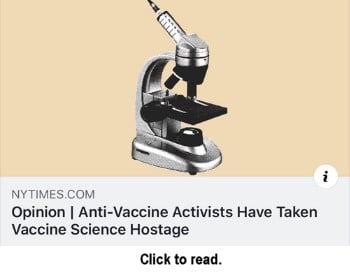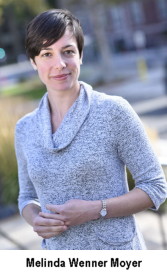NY Times Vaccine Science “Hostage” Op-Ed is a Gift
Underneath one of the more absurd cause-and-effect conjectures ever undertaken by a reporter lies a treasure-trove of truth about vaccine safety science. If the study results implicate vaccines, scientists are pressured to suppress.
 NEW YORK, New York—I just got finished reading Melinda Wenner Moyer’s Op-Ed in the New York Times Anti-Vaccine Activists Have Taken Vaccine Science Hostage, and I must say that was one of the more unusual and contradictory pieces of journalism I’ve ever read in my time as an autism activist. While a casual reader may in some way leave the article thinking that “anti-vaccine activists” are ruining the party for everyone, I think many more will leave puzzled, confused, and suspicious.
NEW YORK, New York—I just got finished reading Melinda Wenner Moyer’s Op-Ed in the New York Times Anti-Vaccine Activists Have Taken Vaccine Science Hostage, and I must say that was one of the more unusual and contradictory pieces of journalism I’ve ever read in my time as an autism activist. While a casual reader may in some way leave the article thinking that “anti-vaccine activists” are ruining the party for everyone, I think many more will leave puzzled, confused, and suspicious.
On the one hand, Ms. Moyer tries to convince her readers of one of the more preposterous cause-and-effect relationships I’ve ever seen. Namely, she wants you to believe that the reason scientists studying the safety of vaccines are scared to publish negative results is because anti-vaccine activists will exaggerate or spin the results and scare the public. This strains credulity to the point that I think if you surveyed 1,000 people and asked this question:

You’d get 997 people to choose “A” and three people—Ms. Moyer, Dr. Paul Offit, and Dr. Peter Hotez—would choose “B.” The pharmaceutical industry is the most financially powerful and ruthless commercial opponent the world has ever seen. I know that sounds dramatic, but consider the recent news that pharmaceutical executives knowingly conspired to create an opioid addiction epidemic. In their compelling critique, “The Opioid Epidemic: Fixing a Broken Pharmaceutical Market,” Harvard medical scholars Ameet Sarpatwari, Michael S. Sinha, and Aaron S. Kesselheim put the behavior of pharmaceutical companies in painful relief:
Finally, to boost profits, pharmaceutical companies have often engaged in false or misleading marketing. Over the past twenty-five years, the industry has paid $35.7 billion to settle claims of illegal marketing, including making false or misleading claims or failing to disclose known risks. In 2012, for example, GlaxoSmithKline paid three billion dollars to settle civil claims and criminal charges that it downplayed the risk of the antidepressant paroxetine (Paxil) in adolescents, promoted the antidepressant bupropion (Wellbutrin) for unapproved uses, and hid data showing the increased risk of heart attacks from the diabetes drug rosiglitazone (Avandia). Although the then-largest healthcare fraud settlement in US history, the total penalty was “only a portion of the drug maker’s profits from the drugs involved.” Almost every major pharmaceutical company has been caught in similar marketing scandals. However, the industry remains highly profitable, supporting criticism that monetary penalties generally represent “a quite small percentage of . . . global revenue and often a manageable percentage of the revenue received from the product under scrutiny.”
Lest you think Big Pharma’s rapacious behavior is confined to the marketing of their products, worry not, we see a similar dangerous pattern of behavior for how Big Pharma manages scientific studies. In 2010, German scientists at the highly-respected and independent Institute for Quality and Efficiency in Health Care (IQWiG) published a study titled, “Reporting bias in medical research – a narrative review.” None of it will surprise you, here’s a small sample:
“The numerous examples identified show that reporting bias concerns not only previously highlighted therapies such as antidepressants, pain medication, or cancer drugs, but affects a wide range of indications and interventions. Many cases involved the withholding of study data by manufacturers and regulatory agencies or the active attempt to suppress publication by manufacturers, which either resulted in substantial delays in publication (time-lag bias) or no publication at all…Published evidence tends to overestimate efficacy and underestimate safety risks. The extent of misestimation is often unknown.”
Reporting on the widely-read German study, journalist Jeremy Hsu noted:
“Oftentimes, medical journals or pharmaceutical companies that sponsor research will report only ‘positive’ results, leaving out the non-findings or negative findings where a new drug or procedure may have proved more harmful than helpful.”

Do you understand what Ms. Moyer is trying to get you to believe? She’s claiming that scientists really WANT to publish studies that might show the dark side of vaccines but they’re AFRAID, not because of the most ruthless industry the world has ever seen, but because parents like me will take that science, misinterpret it, and scare the public. She writes “It’s understandable for scientists to be nervous. The internet has made it easy for anti-vaccine activists to mislead.”
Let me tell you a quick story. I had an inside seat watching the scientists of the first vaccinated-unvaccinated study ever done try and find a scientific journal that would publish their results. These were scientists who had published dozens of studies. It took several years. Many scientific journals turned the study down, some quietly citing “pressure” as the primary reason. The university where the researchers worked got nervous. Everyone was scared. Did any of the journals that declined the study or the university fellows fear “anti-vaccine activists”? No, they didn’t.
They all feared the same thing: losing funding and being blacklisted by the source of so much of their money: Big Pharma.
Last year, journalist Martha Rosenberg wrote an article for The Huffington Post about Big Pharma and vaccines. She seemed to understand who the bad guy really was, unlike Ms. Moyer. Her headline spoke for itself:
As you might expect, Ms. Rosenburg’s article was removed from The Huffington Post mere hours after it was posted. Alienating their biggest advertisers is not part of the HuffPo business plan.
The giant gift: confirmation of scientific censorship
Enough about Big Pharma. I think you get my point: Big Pharma is ruthless and punishing, everyone knows it, and everyone’s scared of them. But that’s actually where the gift of Ms. Moyer’s Op-Ed starts. She actually gets two of the vaccine scientists who have published negative vaccine safety studies, on the record, to admit how much pressure they were under NOT to publish their work. For someone like me, this is one of the first times I’ve seen something we knew was true (that science showing vaccines cause harm is suppressed) actually spelled out in black and white, and in the mainstream media, no less!
From George Washington University researchers:
“I had interesting conversations with vaccine people. They said, ‘What are you doing, Lone? You are ruining everything,’” recalls Dr. Simonsen, who is now a global public health researcher at George Washington University.
From Canadian researchers:
In 2009, Danuta Skowronski, the lead epidemiologist in the division of Influenza and Emerging Respiratory Pathogens at the British Columbia Center for Disease Control, and her colleagues stumbled across unexpected data that suggested a link between seasonal flu shots and an increased risk for pandemic flu. The findings could not prove a causal link — perhaps people who get seasonal flu shots differ from those who don’t in ways that make them more susceptible to pandemic strains. But one possible interpretation is that seasonal flu shots inhibit immunity to those strains. Dr. Skowronski’s team replicated the findings in five different studies and then shared the data with trusted colleagues. “There was tremendous pushback,” Dr. Skowronski recalls, and some questioned whether “the findings were appropriate for publication.“I believed I had no right to not publish those findings,” Dr. Skowronski says. “They were too important.” The findings were submitted to three journals and underwent at least eight lengthy reviews before the final study was published in PloS Medicine.
What’s interesting about the two examples Ms. Moyer provides is that neither of the scientists mentions anything about the fear of “anti-vaccine activists” mischaracterizing results being a source of pressure…because of course it wasn’t.
“A Few Good Men” moment?
As if it wasn’t great enough for Ms. Moyer to provide confirmation that scientists are pressured not to publish negative results about vaccine safety, Ms. Moyer also gave Big Pharma’s most well-compensated mouthpiece—Dr. Paul Offit—the opportunity to have another one of his “A Few Good Men” moments (as in, “you can’t handle the truth!) Just read it for yourself:
“Last September, researchers with the Vaccine Safety Datalink, a collaborative project between the Centers for Disease Control and Prevention and various health care organizations, published a study in the journal Vaccine that found an association — not a causal link, the authors were careful to note — between a flu vaccine and miscarriage. Soon after, Paul Offit, the director of the Vaccine Education Center at the Children’s Hospital of Philadelphia and co-inventor of a lifesaving rotavirus vaccine, said in The Daily Beast that the paper shouldn’t have been published, in part because the study was small and conflicted with earlier research. He also suggested that the authors had cherry-picked their data — a charge they vehemently deny. One physician questioned in the popular blog Science-Based Medicine why the research had been funded in the first place.”
Dr. Offit says that researchers should handle findings differently when there’s a chance they might frighten the public. He thinks that small, inconclusive, worrying studies should not be published because they could do more harm than good. “Knowing that you’re going to scare people, I think you have to have far more data,” he explains.
Don’t you just love that? As Levi Quackenboss points out today in his excellent rebuttal to Ms. Moyer’s Op-Ed, Dr. Offit is more than happy to publicize studies with similar or even less data, if the studies make vaccines look GOOD. What’s Dr. Offit really saying? Don’t publish the negative data—ever!
And, finally…
While I’m ultimately grateful she wrote it, there is one more gripe I have about Ms. Moyer’s piece. We got to hear from these vaccine safety scientists. We got to hear from industry spokespeople like Dr. Offit. But we never got to hear from any of these “anti-vaccine activists.” The monster in the closet, the troublemaker ruining the party for everyone, just remains amorphous and anonymous. Accordingly, I thought I’d introduce you to a few of the people Ms. Moyer and certainly Dr. Offit are talking about, to personalize things a little more, and perhaps give Ms. Moyer a roadmap if she ever re-visits the topic. There’s so many amazing people in what would more appropriately be termed the vaccine safety movement, that I’ll just focus on a few of the people who are published authors on this topic and I’m certain would have sat with Ms. Moyer for an interview:
 Mary Holland is Director of the Graduate Legal Skills Program at New York University School of Law. She’s the co-author of Vaccine Epidemic and the upcoming book The HPV Vaccine on Trial. She received her undergraduate degree from Harvard University (cum laude) and her master’s degree and law degree, with honors, from Columbia University.
Mary Holland is Director of the Graduate Legal Skills Program at New York University School of Law. She’s the co-author of Vaccine Epidemic and the upcoming book The HPV Vaccine on Trial. She received her undergraduate degree from Harvard University (cum laude) and her master’s degree and law degree, with honors, from Columbia University.
 Louise Kuo Habakus is also the co-author of Vaccine Epidemic. She’s the founder and executive director of FearlessParent.org. Earlier, she was a consultant with Bain & Co., one of the most elite management consulting firms in the world, and a C-level executive for Prudential Financial and Putnam Investments. She graduated Phi Beta Kappa with distinction and departmental honors from Stanford University, where she also received a graduate degree in international policy studies.
Louise Kuo Habakus is also the co-author of Vaccine Epidemic. She’s the founder and executive director of FearlessParent.org. Earlier, she was a consultant with Bain & Co., one of the most elite management consulting firms in the world, and a C-level executive for Prudential Financial and Putnam Investments. She graduated Phi Beta Kappa with distinction and departmental honors from Stanford University, where she also received a graduate degree in international policy studies.
 Mark Blaxill has published a number of articles, letters and commentaries on autism in journals such as Public Health Reports, the International Journal of Toxicology, the Journal of Autism and Developmental Disorders, Neurotoxicology and Medical Hypotheses. He’s the co-author of two books about autism and vaccines: The Age of Autism and Denial. Mark spent 25 years at the prestigious Boston Consulting Group, where he was a Senior Vice President. Recently, he co-founded 3LP Advisors, an advisory firm focused on intellectual property transactions, where he is a Managing Partner. He received a bachelor’s degree summa cum laude from the Woodrow Wilson School of Public and International Affairs at Princeton University and an MBA with distinction from Harvard Business School.
Mark Blaxill has published a number of articles, letters and commentaries on autism in journals such as Public Health Reports, the International Journal of Toxicology, the Journal of Autism and Developmental Disorders, Neurotoxicology and Medical Hypotheses. He’s the co-author of two books about autism and vaccines: The Age of Autism and Denial. Mark spent 25 years at the prestigious Boston Consulting Group, where he was a Senior Vice President. Recently, he co-founded 3LP Advisors, an advisory firm focused on intellectual property transactions, where he is a Managing Partner. He received a bachelor’s degree summa cum laude from the Woodrow Wilson School of Public and International Affairs at Princeton University and an MBA with distinction from Harvard Business School.
 And last and certainly least, there’s me, J.B. Handley. My first book, How to End the Autism Epidemic, will be published on September 19th by Chelsea Green Publishing. I co-founded Generation Rescue back in 2005 with my wife (also a Stanford graduate). In my business career, I founded a multi-billion dollar private equity firm, which I co-managed for nearly 20 years. I graduated, with honors, from Stanford University with a dual B.A. degree in Economics and East Asian Studies.
And last and certainly least, there’s me, J.B. Handley. My first book, How to End the Autism Epidemic, will be published on September 19th by Chelsea Green Publishing. I co-founded Generation Rescue back in 2005 with my wife (also a Stanford graduate). In my business career, I founded a multi-billion dollar private equity firm, which I co-managed for nearly 20 years. I graduated, with honors, from Stanford University with a dual B.A. degree in Economics and East Asian Studies.
There’s four published authors and card-carrying members of the “anti-vaccine activists” Ms. Moyer referenced in her Op-Ed. A scary bunch, aren’t we? We have something else in common, too. We all have children with autism, and we all understand this topic at a level of depth that Ms. Moyer isn’t anywhere near. Looking back over our biographies, I can see why Ms. Moyer never called.
Sign up for free news and updates from Children’s Health Defense. CHD focuses on legal strategies to defend the health of our children and obtain justice for those injured. We can't do it without your support.



